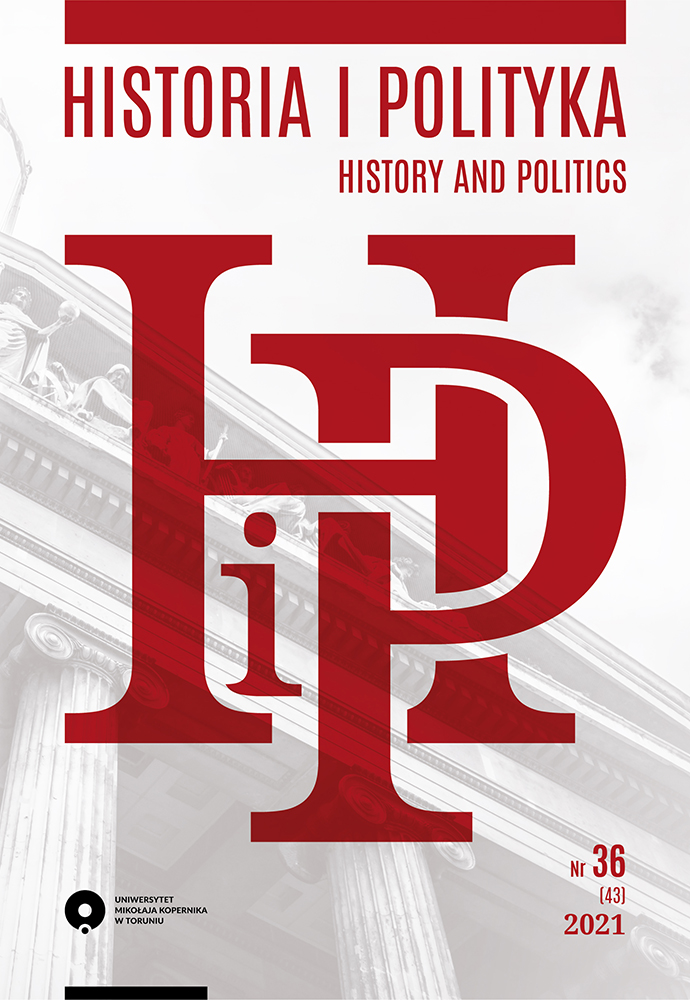The Blame Game: Narratives of Electoral Defeat and Party Change. The Case of Four Polish Political Parties
DOI:
https://doi.org/10.12775/HiP.2021.015Słowa kluczowe
electoral defeat, party change, narrative, interpretive approachAbstrakt
The purpose of the article is to present party elites’ narratives about electoral defeat in order to identify characteristics of the narratives which may inhibit or facilitate party change. The opening sections explain theoretical approach and methodology adopted for the research. The next paragraphs reconstruct and compare narratives of four Polish political parties, which experienced electoral defeat in 2011 and 2015 parliamentary elections, and give a psychological explanation for their emergence. As a result, four narrative strategies were identified of which only one seems to have potential to facilitate party change. Its distinctive feature is internalization of blame, whereas the others reveal tendency to denial or personalize and externalize blame.
Bibliografia
Aronson, E. (1968). Dissonance theory: progress and problems. In: R.P. Abelson (Ed.). Theories of Cognitive Consistency: A Sourcebook (pp. 5–27). Chicago, IL: Rand McNally.
Bevir, M. (2006). How Narratives Explain. In: D. Yanow, & P. Schwartz-Shea (Eds.). Interpretation and Method: Empirical Research Methods and the Interpretive Turn (pp. 281–290). Armonk, NY, London: M.E. Sharpe.
Bevir, M., & Rhodes, R.A.W. (2002). Interpretive Theory. In: D. Marsh, & G. Stoker (Eds.). Theory and Methods in Political Science (pp. 131–152). Houndmills, Basingstoke, Hampshire: Palgrave Macmillan.
Bevir, M., & Rhodes, R.A.W. (2015). Interpreting Political Science: Mapping the Field. In: M. Bevir, & R.A.W. Rhodes (Eds.). The Routledge Handbook of Interpretive Political Science (pp. 3–27). London, New York: Routledge.
Bruner, J. (1986). Actual Minds, Possible Worlds. Cambridge, London: Harvard University Press.
Corbetta, P. (2003). Social Research: Theory, Methods and Techniques. London, Thousand Oaks, New Delhi: SAGE Publications.
Czarniawska, B. (2004). Narratives in Social Science Research. London, Thousand Oaks, New Delhi: SAGE Publications.
Della Porta, D., & Keating, M. (2008). How Many Approaches in the Social Sciences? An Epistemological Introduction. In: D. Della Porta, & M. Keating (Eds.). Approaches and Methodologies in the Social Sciences: A Pluralist Perspective (pp. 19–39). Cambridge: Cambridge University Press.
Deschouwer, K. (1992). The Performance of Organizational Forms: A Conceptual Framework for the Understanding of Party Adaptation and Change. Revised version of paper presented at ECPR General Conference in Limerick, Ireland.
Fiske, S.T., & Taylor, S.E. (2008). Social Cognition: From Brains to Culture. Boston: McGraw Hill.
Furlong, P., & Marsh, D. (2010). A Skin Not a Sweater: Ontology and Epistemology in Political Science. In: D. Marsh, & G. Stoker (Eds.). Theory and Methods in Political Science (3rd Ed.) (pp. 184–211). Basingstoke: Palgrave Macmillan.
Gauja, A. (2017). Party Reform: The Causes, Challenges, and Consequences. New York: Oxford University Press.
Kohler Riessman, C. (1993). Narrative Analysis. Newbury Park, CA, London, New Delhi: SAGE Publications.
Laszlo, J. (2008). The Science of Stories: An Introduction to Narrative Psychology. London, New York: Routledge.
Mair, P., Müller, W.C., & Plasser, F. (2004). Introduction: Electoral Challenges and Party Responses. In: P. Mair, W.C. Müller, & F. Plasser (Eds.). Political Parties and Electoral Change (pp. 1–19). London, Thousand Oaks, CA, New Delhi: SAGE Publications.
Miller D.T., & Ross, M. (1975). Self-serving Biases in the Attribution of Causality: Fact or Fiction? Psychological Bulletin, 82(2), 213–225. DOI: 10.1037/h0076486.
Pacześniak, A., & Bachryj-Krzywaźnia, M. (2019). Electoral Defeat as ‘Mother of Party Change’: Toward Objective-Subjective Approach. Czech Journal of Political Science, 26(2), 122–134. DOI: 10.5817/PC2019-2-122.
Pacześniak, A., Bachryj-Krzywaźnia, M., & Kaczorowska, M. (2020). Electoral Defeat and Party Change: When Do Parties Adapt? Political Preferences, 27, 63–78. DOI: 10.31261/polpre.2020.27.63-78.
Polkinghorne, D.E. (1983). Methodology for the Human Sciences: Systems of Inquiry. Albany: State University of New York Press.
Polkinghorne, D.E. (1988). Narrative Knowing and the Human Science. New York: State University of New York Press.
Polkinghorne, D.E. (1995). Narrative Configuration in Qualitative Analysis. In: J.A. Hatch, & R. Wisniewski (Eds.). Life History and Narrative (pp. 5–23). London, Washington D.C.: The Falmer Press.
Sarbin, T.R. (1986). The Narrative as a Root Metaphor for Psychology. In: T.R. Sarbin (Ed.). Narrative Psychology: The Storied Nature of Human Conduct (pp. 3–21). Westport, London: Praeger Publishers.
Schank, R.C., & Abelson, R.P. (1995). Knowledge and Memory: The Real Story. In: R.S. Wyer, Jr (Ed.). Knowledge and Memory: Real Story (pp. 1–86). Hillsdale, NJ, Hove, UK: Lawrence Erlbaum Associates.
Shenhav, S.R. (2006). Political Narratives and Political Reality. International Political Science Review, 27(3), 245–262. DOI: 10.1177/0192512106064474.
Sugiman, T., Gergen, K.J., Wagner, W., & Yamada, Y. (2008). The Social Turn in the Science of Human Action. In: T. Sugiman, K.J. Gergen, W. Wagner, & Y. Yamada (Eds.). Meaning in Action: Constructions, Narratives and Representations (pp. 1–22). Tokyo: Springer.
Trzebiński, J. (2002). Narracyjne konstruowanie rzeczywistości [Narrative Construction of Reality]. In: J. Trzebiński (Ed.). Narracja jako sposób rozumienia świata [Narrative as a Mode of World Comprehension] (pp. 17–42). Gdańsk: Gdańskie Wydawnictwo Psychologiczne.
Wojciszke, B. (1986). Teoria schematów społecznych: Struktura i funkcjonowanie jednostkowej wiedzy o otoczeniu społecznym [Theory of Social Schemata: Structure and Functioning of Individual Beliefs about Social Enviroment]. Wrocław: Zakład Narodowy im. Ossolińskich.
Wolosin, R.J., Sherman, S.J., & Till, A. (1973). Effects of Cooperation and Competition on Responsibility Attribution after Success and Failure. Journal of Experimental Social Psychology, 9(3), 220–235. DOI: 10.1016/0022-1031(73)90011-5.
Zuckerman, M. (1979). Attribution of Success and Failure Revisited, or: The Motivational Bias Is Alive and Well in Attribution Theory. Journal of Personality, 47(2), 245–287. DOI: 10.1111/j.1467-6494.1979.tb00202.x.
Pobrania
Opublikowane
Jak cytować
Numer
Dział
Licencja
Prawa autorskie (c) 2021 Maciej Bachryj-Krzywaźnia

Utwór dostępny jest na licencji Creative Commons Uznanie autorstwa – Bez utworów zależnych 4.0 Międzynarodowe.
Uniwersytet Mikołaja Kopernika w Toruniu respektuje prawo do prywatności i ochrony danych osobowych autorów.
Dane autorów nie są wykorzystywane w celach handlowych i marketingowych. Redaktorzy i recenzenci są zobowiązani do zachowania w poufności wszelkich informacji związanych ze złożonymi do redakcji tekstami.
Autor, zgłaszając swój tekst wyraża zgodę na wszystkie warunki i zapisy umowy licencyjnej (określającej prawa autorskie) z Uniwersytetem Mikołaja Kopernika w Toruniu.
Statystyki
Liczba wyświetleń i pobrań: 1005
Liczba cytowań: 0



